| Srl | Item |
| 1 |
ID:
025309
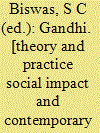

|
|
|
|
|
| Publication |
Calcutta, K P Bagchi and Company, 1969.
|
| Description |
xvi, 635p.Hbk
|
| Standard Number |
8170740584
|
|
|
|
|
|
|
|
|
|
|
|
Copies: C:1/I:0,R:0,Q:0
Circulation
| Accession# | Call# | Current Location | Status | Policy | Location |
| 031772 | 923.254/BIS 031772 | Main | On Shelf | General | |
|
|
|
|
| 2 |
ID:
126787
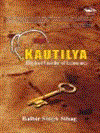

|
|
|
|
|
| Publication |
New Delhi, Vitasta Publishing Pvt Ltd, 2014.
|
| Description |
429p.Hbk
|
| Standard Number |
9788192535494
|
|
|
|
|
|
|
|
|
|
|
|
Copies: C:1/I:0,R:0,Q:0
Circulation
| Accession# | Call# | Current Location | Status | Policy | Location |
| 057566 | 330.150954/SIH 057566 | Main | On Shelf | General | |
|
|
|
|
| 3 |
ID:
152636
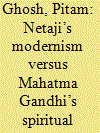

|
|
|
|
|
| Summary/Abstract |
Subhas Chandra Bose, being a Secularist, had an attitude of impartiality towards all religions. According to him, the Government of Free India must have an absolutely neutral and impartial attitude towards all religions and leave it to the choice of every individual to profess or follow a particular religion of his faith; Religion is a private affair, it cannot be made an affair of the State.
|
|
|
|
|
|
|
|
|
|
|
|
|
|
|
|
| 4 |
ID:
116267
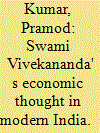

|
|
|
| 5 |
ID:
133028
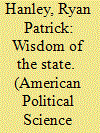

|
|
|
|
|
| Publication |
2014.
|
| Summary/Abstract |
Adam Smith's engagement with China and Tartary is a central yet underappreciated element of his economic and political thought. This article reconstructs this engagement and demonstrates its broader significance, arguing that it focuses on three themes: the economic institutions that promote domestic growth in a manner that alleviates the material conditions of the poorest, the social and political conditions that minimize the dependence of the poor on the wealthy, and the ethical values and civic institutions that guarantee the existential survival of the state. This treatment is significant for three reasons: It offers useful insight into the contested issue of Smith's conception of legitimate state action; it clarifies Smith's vision of a commercial order that promotes human dignity; and it reveals the depth of his participation in a specific contextual debate.
|
|
|
|
|
|
|
|
|
|
|
|
|
|
|
|